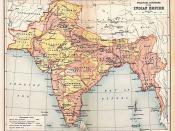Throughout history, many nations have implemented imperialism to enforce their will over others for money, protection and civilization. India was no exception. Since its discovery, Europeans were trying get a piece of India's action. In many cases England was the imperial, or mother country. Since India was put under imperialism, a great deal of things changed, some for the good, mostly though for the bad. Between 1640 and 1949, India was ruled by two periods of imperialism, both of which effected India in a very profound and permanent manner.
The first period of European control was between 1740 and 1858. During this period the British East India Company controlled the Indian sub-continent under the guise of economic imperialism, when in fact the manipulation of Indian affairs was much more political than let on. When it was founded in 1600 by Queen Elizabeth I, the East India Company's main purpose was 'to break into the Indonesian spice trade which was dominated by the Dutch.'
But after colonizing a post a Madras in 1640, the company was re-chartered to include such rights as coining money and act as government to British subjects at the East India Company's posts. As well, the British government also gave the company the right to make was or peaceful arrangements with powers who were non-Christian. This control expanded with the founding of a port at Bombay in 1668, and the founding of Calcutta in 1690. Then in 1756, a young employee named Robert Clive, who had been named lieutenant-governor in 1755, was sent to take back Calcutta from the Bengal nawab. He accomplished this in January of 1757. Then later that year, Clive lead a group of 950 European and 2,000 Indian soldiers(sepoys) against a group of 50,000 Indians lead by a degenerate nawab at Plassey. The...


